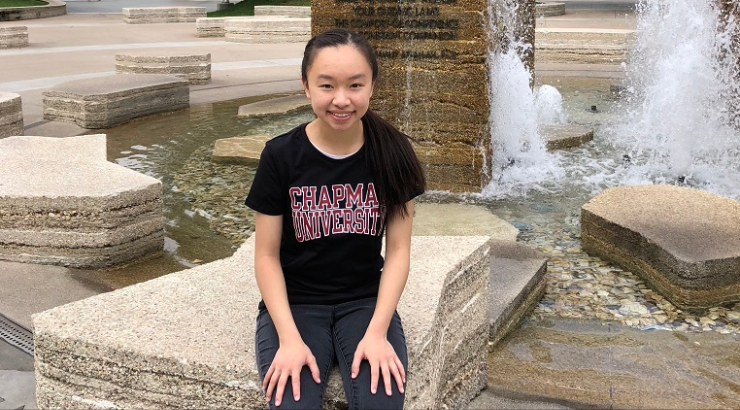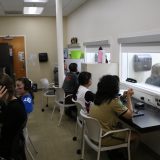
Freshman Spotlight Danielle Liu '22 talks to us about landing a research position in her first term at CU
September 4, 2018
CU- You come to Chapman with a stellar academic record! Can you share your top three tips for academic excellence?
DL– My biggest tip for academic excellence would be to have intrinsic motivation and drive. I often find motivation by setting goals before myself. Having a positive attitude is also vital to sustaining intrinsic motivation. The mindset “I can’t do ____” immediately impedes the path to success.
My second tip for academic excellence would be to always try your best, and to leave the results to God. Colossians 3:23 states, “Whatever you do, work at it with all your heart, as working for the Lord, not for human masters.” My mom has helped to foster this principle ever since I was in elementary school when she told me, “I don’t care about your grades as long as you try your best.”
Finally, my last tip would be to ask questions and to be curious. In high school, whenever I needed extra explanation to understand a concept, I would ask my teachers for help during break. Intellectual curiosity also played an important role in my academic success. Exploring context and information beyond what is necessary for the test helped me to gain a deeper understanding of big picture concepts.
CU- Did you work with an academic coach or advisor in high school?
DL– I did not have an academic coach in a conventional sense, but I had many mentors who gave me advice along the way. For example, Mr. Dan Moyer, the former vice principal and current principal of my alma mater enabled me to take the classes that I wanted to take each year. He also provided huge support for me through my high school career, and his encouragement inspired me to excel. I also had the opportunity to have Mr. Walter Stahr, an author who graduated from Harvard Law School, as my primary college application counselor. He played an integral role in my college application process. Through his guidance, I was admitted as a biology major to a number of top universities, including Brown, Cornell, and Duke.
CU- We were very impressed that you secured a lab position as a freshman. How did you land a job in the prestigious Early Human and Lifespan development lab?
DL– When I toured Chapman University last year, Dr. Frank Frisch advised me to seek research opportunities as soon as possible. Consequently, this summer, I looked on the Chapman website for undergraduate research opportunities through Crean College. After reading about the Early Human and Lifespan Development Lab, I set out to write a cover letter and a resume to pursue a position in this lab. I started the task by doing a lot of research; I probably sifted through about thirty different websites filled with tips and examples on how to write these two important documents before I actually wrote them. Finally, I emailed Dr. Glynn, asking for a research position in her lab. After a brief interview and a tour of Dr. Glynn’s lab facilities, Dr. Glynn formally invited me to be a part of her lab. I feel so blessed and honored to be chosen, and I am very grateful for the opportunity!
CU- May we share an excerpt of your letter of introduction with our readers?
DL– Here is the first part of my cover letter:
Dear Dr. Glynn,
I write with high hopes of obtaining a position as a research assistant in your Early Human and Lifespan Development program. An incoming freshman at Chapman University, I plan to pursue a double major in health science and violin performance. Ultimately, I aim to be an obstetrician gynecologist, so the people groups and areas of study targeted by your research are of particular interest to me. Reading the discoveries that have already resulted from your research thus far has been eye opening and inspiring.
CU- What excites you most about Dr. Glynn’s research?
DL– So much! I think what most excites me is the huge amount of data that Dr. Glynn’s research team has already gathered and continues to collect. In my meeting with Dr. Glynn, she explained that their research has collected data on about 500 families over the span of about twenty years. They have collected both biological data and psychological data. When I walked through Dr. Glynn’s lab facilities, I imagined all the people who have walked in and out of that building: mothers doing blood and saliva tests, young toddlers playing as researchers observe their motor skills, and adolescents engaging in computer activities assessing their cognition, just to name a few. It amazes me that I can be a part of this huge project.
CU- You are pursuing a degree in Health Sciences with the ambition of becoming a physician. What attracts you to health care?
DL– Actually, I applied to Chapman as a Violin Performance major with plans of adding a second major in Health Science. I am attracted to health care because I feel that as a physician, I can have the opportunity to touch and bless the lives of my patients. I want to be able to serve people; as a doctor, I can do so through my words, through my time, and through the medical knowledge and skills gained on the long trek through medical school. In the hospital, I hope to form relationships with my patients, helping them to feel comfortable and genuinely cared for. Ultimately, I want to be a person who saves and changes lives, and that is what draws me to the medical field. I know it will be a long road, but I also know that it will be a rewarding one.
CU- We understand that you are also an accomplished musician. Tell us about that.
DL– Music is one of my greatest passions; I have been playing the violin since I was four years old, and making music with my mom and my younger sister is my favorite pastime. I served as the Concertmistress of the Pacific Symphony Youth Orchestra in my senior year as well as when the orchestra went on a concert tour through three major cities in China. I also won the orchestra concerto competition twice, gaining the opportunity to play solo with the orchestra in Segerstrom Concert Hall. I have played as a soloist with the professional Pacific Symphony on a few different occasions as well.
I have also participated in and won multiple violin competitions, including first place in the American Protégé International Piano and Strings Competition, through which I earned the opportunity to perform as a soloist in the prestigious Carnegie Hall. I have also performed in masterclasses with Robert DeMaine (principal cellist of the LA Philharmonic), Cho-Liang Lin, and Pinchas Zukerman.
This past year, I have studied with Sam Fischer in the Colburn School of Music. Chapman University has granted me the Temianka Scholarship of $10,000 to study as a violin performance major in the university, and I am excited to study with Professor Fitzpatrick and get involved in the music program at Chapman!
CU- What excites you most about coming to Chapman?
I do not know if there is a single thing that excites me the most about coming to Chapman, but rather a huge conglomeration of different aspects of the upcoming journey.
I am thrilled that I have the opportunity to study and pursue majors in both health science and violin performance. I am excited that I will continue to be able to perform and study the violin seriously, while still gaining knowledge and experience in medicine so that I can pursue a career as a physician.
I am also very thankful for all the support that I have already received from the Chapman community. Dr. Eric Sternlicht has been a momentous figure in my transition to college, as he has provided so much (literally essays of) advice to me in regards to my class scheduling, the next steps to take as I aim for medical school, and so much more. Dr. Bob Becker, Director of String Studies at Chapman, has also been very welcoming to me and willing to answer many of my questions about Chapman and its music program. Miss Dina Bartoloni has also been an essential guiding hand, patiently bearing through my many questions. Most of all, I am thankful for Dr. Glynn for accepting me to be a part of her research lab.
I feel so blessed to be a part of the Chapman family, and I am very excited to be a part of this supportive and caring community.

